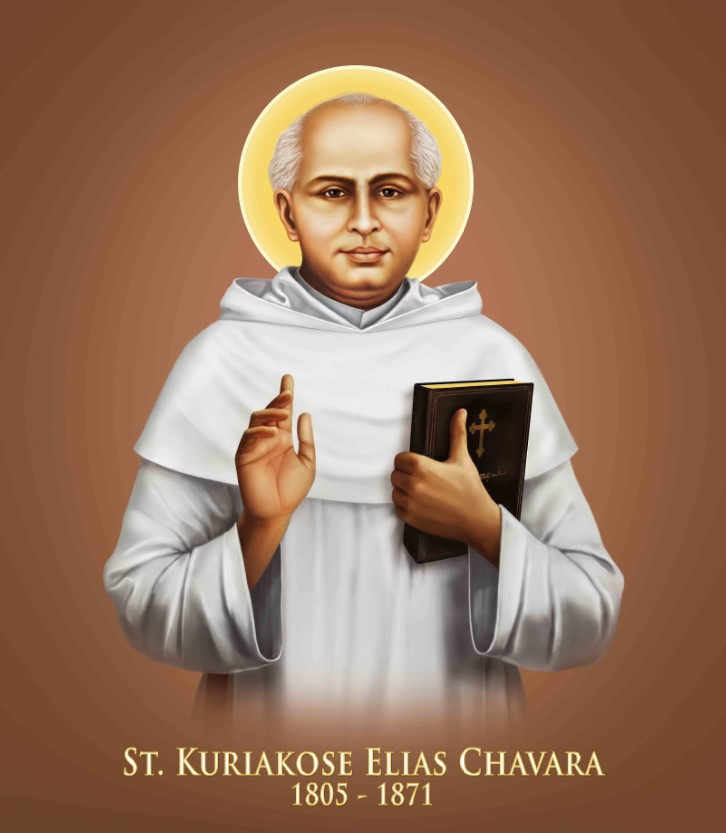Kuriakose Elias Chavara was born on 10th February 1805 to Iko Chavara and Mariam Thoppil at Kainakary, Kerala. From age 5 to 10, he attended the village school to study languages, different dialects, and elementary sciences. Fr Thomas Palackal, the Rector of the seminary at Pallipuram invited Kuriakose to the seminary. As he was too young, Kuriakose spent two years in the parish rectory under the care of the Parish Priest. In 1818, at the age of 13, he joined the seminary. During this time there was an epidemic in Kainakary. Kuriakose lost his parents and only brother to this epidemic. He was now the only heir to the family and relatives convinced him discontinue to seminary life, albeit reluctantly. He soon arranged the family affairs in such a way that he could return to his priestly formation.
In 1829, at the age of 24, he was ordained a priest at St Andrew’s Basilica, Arthunkal. After ordination he was engaged for some time in pastoral ministry; however, he soon returned to teach at the seminary, burning with a desire to found a religious institute. He was welcomed by Fr Thomas Palackal and Fr Thomas Porukara who shared a similar vision for religious community life. His trust in the providence of God and the ardent desire to lead a more radical way of Christian discipleship led him to found the Congregation of Carmelites of Mary Immaculate (CMI), the first congregation for men in the Syro-Malabar Catholic Church.
For the spiritual renewal of the people Fr Chavara is known to have held 40 Hours’ Adoration. He started several seminaries, introducing annual retreats for priests and people while giving special attention to catechumens. He is also credited with opening a house for the dying and the destitute, as well as schools for general education. He was appointed the first Vicar General of Syro-Malabar Catholics in 1861. It is said that the Church was able to withstand many threats of that time to ecclesial unity owing to his leadership. Fr Kuriakose was convinced that if he did his part the Lord would take care of the rest.
He was once told about a man suffering with smallpox who wished to receive the Sacrament of the Sick. Many warned him against visiting this man, but Fr Kuriakose said, ‘Now it is my duty to take care of this person. God will take care of me.’
He would visit places of dispute and peace would be restored. When he became ill, he retired to a monastery in Koonammavu for treatment. Disputes and quarrels were taking place in the Parish of Anackal and parish elders came to beg Fr Kuriakose to return with them: ‘It is enough if you just come for peace to be restored’. He went with them and indeed the dispute was sorted.
Fr Kuriakose was known to love even his enemies. A man called Mathen unjustly appropriated the land of Mannanam Monastery and filed cases against Fr Kuriakose in court. In spite of this, Fr Kuriakose still loved him, and in his last testament instructed the members of his community to do good to Mathen. He was guided by the conviction that ‘days on which you have not rendered any good to others, will not be reckoned in the book of your life’.
St Kuriakose spent his last days at Koonamavu. In October 1870, he became very ill and lost complete sight for three months. During this time he fixed a little note on the door asking visitors to speak to him only of spiritual matters. He died on 3rd January 1871.
He was canonized by Pope Francis at St Peter’s Square on 23rd November 2014.
In our diocese, St Joseph’s in Wembley is under the pastoral care of the Carmelites of Mary Immaculate (CMI), the order he had founded.




